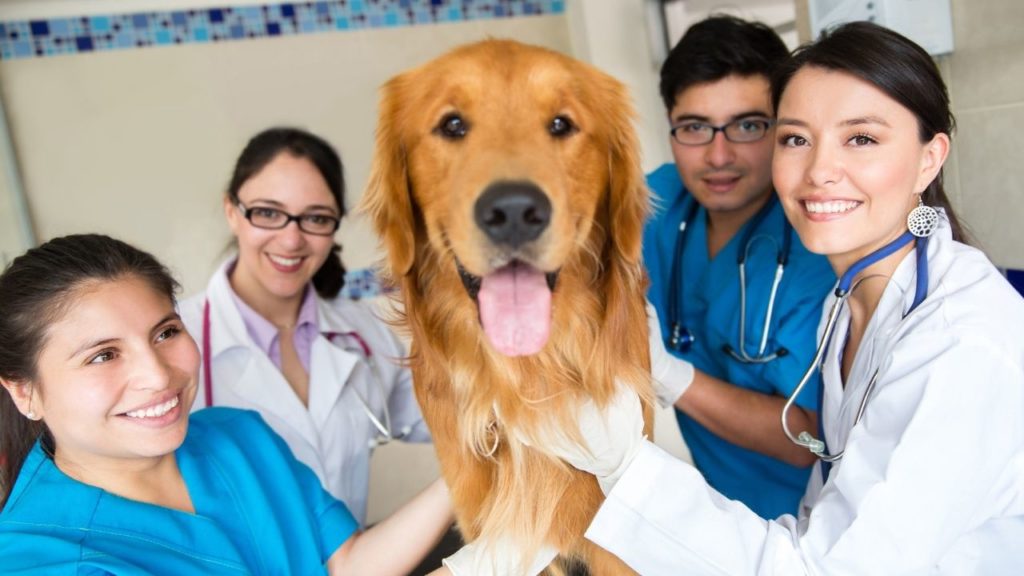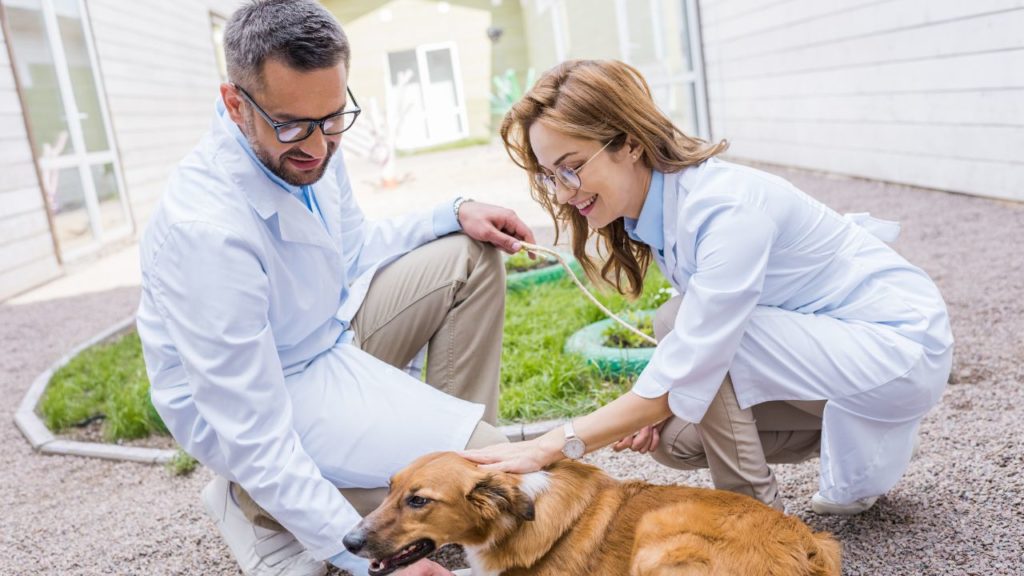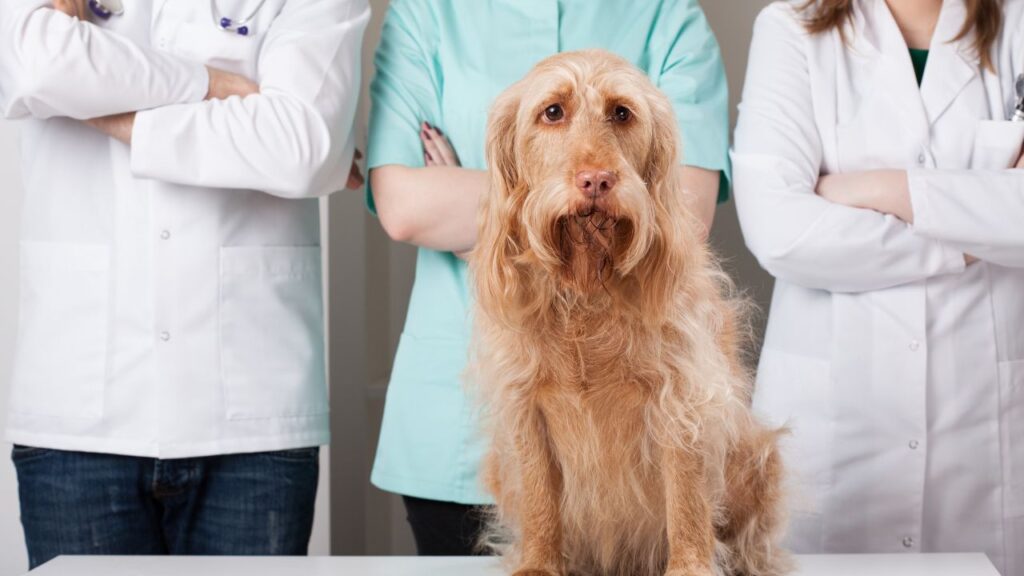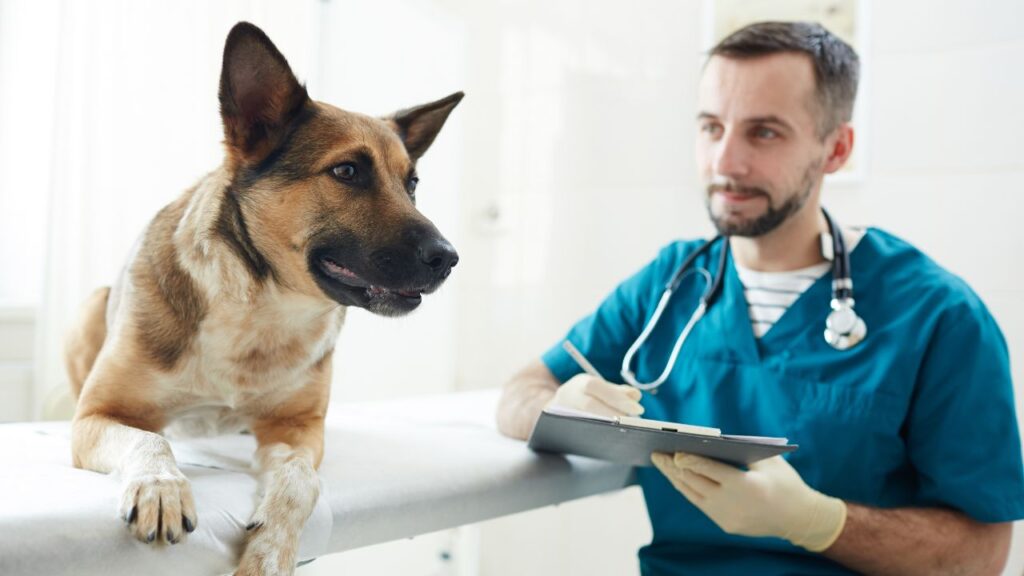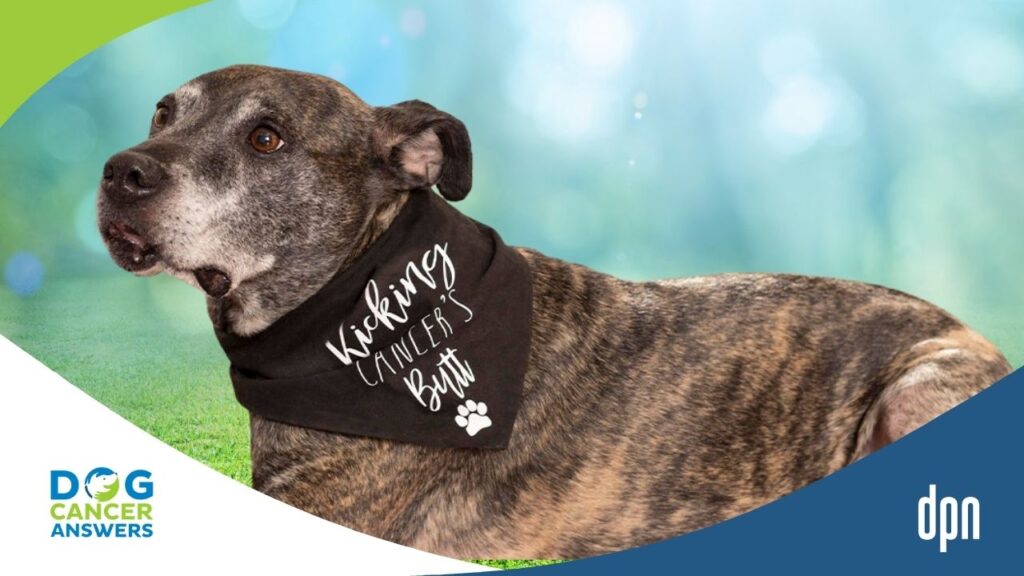EPISODE 190 | RELEASED October 31, 2022
Confused by Dog Cancer Diagnosis? Get a Second Opinion | Dr. David Vail
You’re not the only one confused by dog cancer. A second opinion with an oncologist is the best way to get the latest treatment and diagnosis information.
SHOW NOTES
General practitioners (or your regular vet) are fabulous at screening for diseases like dog cancer. But when it comes to a medical problem that is life threatening and/or will be expensive to treat, oncologist David Vail strongly recommends seeing a specialist if possible.
Getting a dog cancer second opinion with a specialist allows you to confirm your dog’s diagnosis, plus get all of the most up-to-date information on treatment options. Specialists also have a ready network of other experts that they can reach out to if there are any oddities with your dog’s case.
Listen in to learn more about second opinions, including how to ask for one if the diagnosis you got just doesn’t seem to make sense.
Links Mentioned in Today’s Show:
[00:00:00] >> Dr. David Vail: Some very aggressive tumors look very benign under the microscope and some look very malignant, so you really need all the information to make uh, the best diagnosis possible.
[00:00:13] >> Announcer: Welcome to Dog Cancer Answers, where we help you help your dog with cancer.
[00:00:20] >> Molly Jacobson: Hello, friend. When you find out your dog has cancer, not only are you devastated, but you often find yourself having more questions, which lead to vaguer answers, which open up more questions, and it seems to go on and on. At some point you might be wondering: when do you get a second opinion?
Well, we’re gonna talk today to Dr. David Vail. He’s an oncologist from the University of Wisconsin, and he’s gonna talk to us more about when a second opinion is a good idea and how to go about getting one. Dr. David Vail, thank you for joining us today.
[00:00:56] >> Dr. David Vail: Oh, my pleasure.
[00:00:57] >> Molly Jacobson: So we wanted to ask you about getting a second opinion. This is something that comes up a lot for our listeners. They get the bad news. They are sort of blindsided by it. They didn’t know that dogs could even get cancer in some cases, and they truly are wondering, Should I get this checked out? Is it possible my veterinarian made a mistake?
So I wanted to ask you, how important is that second opinion, who should it be with, what are you looking for in a second opinion? Like what do you think, as an oncologist?
[00:01:33] >> Dr. David Vail: Sure. I mean, you know, at the end of the day, whether we’re dealing with our own health or our, the health of our companion, uh, animals, companion dogs and cats, and other, other assorted companions, really you have to be an advocate for your own health. And you know, the field changes quite a bit. Technology changes very quickly. And most of us are receiving primary care through a generalist, uh, a primary care physician or primary care veterinarian.
And while they’re exceptional people, they are primarily, for some disease scenarios, screeners. And that’s really their function, is to screen for when is something appropriate to get, uh, the next step in advanced diagnostics or advanced care, and when is, uh, this something that can be dealt with in the local clinic or not.
So really, if you’re given a diagnosis that has potentially devastating consequences or requires something either very aggressive from a therapy or diagnostic standpoint, very expensive, potential for side effects, it really behooves us to ask our generalist, our, uh, general practitioner, where can we get more information and can we get a, an opinion of a, of a specialist? And that’s ideally what you’re looking for is the, the branch of medicine that you have just been diagnosed with.
There are specialists both on the, the human physician side and on the veterinary side, there are literally dozens of specialties, and in today’s age of knowledge explosion, really no generalists can keep up with everything in each individual specialty, but certainly they’re very, very good at screening.
The other point that I often bring up with my clients, and my students for that matter, is that if you’re dealing with a general practitioner, and thankfully this is rare, but if you’re dealing with a general practitioner who balks or seems offended by you asking for a second opinion, you should get a a different general practitioner. Because the really good ones know their limitations, as we all should, and know when it’s best to refer our clients such that the companion animal can get the best care available and um, uh, have the best access to the highest level of care.
[00:03:57] >> Molly Jacobson: That makes total sense. I think that a lot of people need to hear that advice on both sides of the table.
[00:04:04] >> Dr. David Vail: Yeah. And so certainly, um, from a standpoint of if a diagnosis of cancer or a potential for cancer has been raised, you know that that can certainly be a serious diagnosis. And so it, it really is, um, best to at least explore the options through a specialist so that you know, you know, various aspects of the potential disease.
How sure are they of the diagnosis? Most cancers, the name that’s thrown on the disease in the first place is generally a garbage can name for a dozen different diseases. The classic example would be, "My dog has lymphoma." And lymphoma is really a garbage can classification of two dozen different diseases, all of which, technically, are lymphoma, but there are indent lymphomas that will never affect the patient and they’ll live a normal, healthy life without any treatment at all-
[00:04:59] >> Molly Jacobson: Wow.
[00:04:59] >> Dr. David Vail: -and there are very aggressive forms of lymphoma. So you wanna know exactly what you’re dealing with, if possible. You wanna know the prognosis, what diagnostics should be done to kind of tease out which specific type of cancer you’re dealing with. You wanna know really how advanced the tumor is or the cancer is. And then what are your treatment options, what are your expectations for outcomes depending on whether you decide to become aggressive or conservative.
There’s no black and white, or there rarely is black and white, and you’ll always have several options to choose from. And you, by far – and this is what I tell all my clients – you by far are the best judge of, of your companion’s quality of life and expectations. And you see your companion in their natural environment. You know when they’re feeling well or not. And, um, uh, you’re the best advocate for their care.
So with all these various options available to you, you’re really in the best position to make the decisions as long as you’re clearly educated as to the potential outcomes and the potential therapies.
[00:06:09] >> Molly Jacobson: So the point of getting a second opinion isn’t just to make sure that your dog has cancer, but it’s to make sure that you really understand all of the factors that go into treatment decisions, that you understand everything about that cancer, what the options are, and you can make the most confident decisions later.
[00:06:29] >> Dr. David Vail: Absolutely. I mean, there are several steps that should be taken. And several of those, you know, the first couple of steps certainly the general practitioner is very good at screening for. So the first thing we wanna do is put a name on the cancer, and as specific of a name as we can. Once we have that, the second important step is to find out the stage or how advanced that cancer is, because the same cancer in an early stage can be very curable, whereas in an advanced stage it can be incurable and very difficult to treat.
So we wanna put a name on it, we wanna find out how advanced it is, we wanna know for that cancer and that degree of advancement, what is the best therapy available and what are alternatives from the best therapy. The best therapy may not necessarily be the most aggressive therapy, but it could be. And that may not be something that, uh, I would want, uh, my particular companion to go through knowing potential outcomes.
So again, name, stage of the cancer, how advanced it is, what therapy options there are, what the costs are – not just financial, but the cost to quality of life. And then with those varying degrees of aggressive therapy, what are the outcomes that could be expected. And then once you have all that information, you, as the companion caregiver, can make the best decision for your companion.
[00:07:56] >> Molly Jacobson: Right. So how often does a second opinion differ or correct the first diagnosis?
[00:08:05] >> Dr. David Vail: Yeah, so we’re, we’re kind of talking about two different things. One, that’s the second opinion that we’ve kind of been talking about, where you go to an expert or someone that that is their particular field. And of course you can get a couple of opinions from experts. We don’t always agree as well, especially with some of the diseases where there is no standard of care. And so that’s where you’re looking for more information from a specialist in the field.
Then there’s the second opinion where you want another expert opinion if you’re not quite sure that you agree with it. In a lot of cancer medicine and cancer diagnostics, there’s a certain degree of art as well as science.
[00:08:48] >> Molly Jacobson: Okay. Let’s take a quick break here to hear from our sponsors, and when we get back, I want to talk to you about getting a second opinion on pathology reports.
And we’re back with Dr. David Vail. Dr. Vail, you were saying that medicine is part science, but also part art.
[00:09:10] >> Dr. David Vail: The classic example is pathology. So your veterinarian takes the sample of a tumor and submits it to a laboratory and they get a response back. And the same thing happens on the human side. There’s two people involved, there’s somebody that’s actually seeing the clinical picture, and there’s somebody that’s looking under a microscope and looking at cells. And the two really have to bring both of their knowledge sets to the forefront and discuss this.
So we always talk with my students and with my clients that, you know, especially with my students, when they go out and become veterinarians, that if they get a pathology report back that doesn’t match the clinical picture, that, um, if they don’t question that pathology and something goes wrong down the road, or the outcome is different than what is expected down the road, your client is not gonna know who the pathologist is and come after them, they know you.
[00:10:06] >> Molly Jacobson: Right.
[00:10:06] >> Dr. David Vail: And, and it really is from a standpoint of good medicine is to step back and say, Hey, wait, this doesn’t fit the clinical picture. And there are plenty of examples out there, and it’s actually – the rate of biopsy incorrectness, and it’s not a mistake necessarily, and it’s not an error, it’s just that there, you need all the pieces of information to make the appropriate diagnosis, is around 5%.
[00:10:29] >> Molly Jacobson: Okay.
[00:10:30] >> Dr. David Vail: And that’s both on the physician cancer side and the veterinary cancer side. So, in most human hospitals, there’s something called tumor boards where at the end of every week, all the pathologists get together and review all of the histologies and biopsies and come to an agreement.
And at those tumor boards, there’s generally the clinicians, the actual physicians that are sitting down with the patient, go to those tumor boards as well and give their clinical input and then a, a final decision is made. In academic centers like mine at the University of Wisconsin, we have tumor boards every week as well. And, and the pathologists, the clinicians, the radiation oncologists, the surgical oncologists, the medical oncologists all sit around and go over the case and say, yeah, this is easy. This is a slam dunk.
And there’ll be other cases where, wait a minute, this tumor can’t be benign because it’s eating away at bone, it’s acting like a, a malignancy. And then the pathologist can say, Oh, well, I didn’t know that, that piece of information wasn’t delivered to me. And so, because this is part art, some tumors look very benign, some very aggressive tumors look very benign under the microscope and some look very malignant. So you really need all the information to make uh, the best diagnosis possible.
[00:11:51] >> Molly Jacobson: That’s fascinating. So when I, as a layperson, go to my general practitioner, they take a biopsy, send it off to a pathologist-
[00:12:01] >> Dr. David Vail: Right.
[00:12:02] >> Molly Jacobson: -and I get that report back, has that report necessarily already had a second opinion, someone else weighed in on that? How does that work?
[00:12:10] >> Dr. David Vail: Most pathology groups, major pathology groups, now do that, if not routinely, at least in cases where there is some either controversy or whether it’s not a very black and white situation. And they will generally put that in the pathology report that a consultation with a second pathologist – and they’ll name that second pathologist – was made, or a group of pathologists, and this was the outcome. And they may recommend additional testing, special stains for the biopsy, for example, if it’s not quite clear from standard light microscopy what’s going on.
So that, that’s very common. But it’s, it’s kind of, there’s steps all along the process that if there’s a, an error made at one step, it can greatly affect – it’s kind of like the butterfly effect. If the general practitioner, for example, doesn’t put down a particular clinical finding that would be very important to the pathologist to know, then the pathologist is essentially blind to that aspect of the disease.
And if the pathologist assumes that the sample that was provided them is representative of the entire mass, for example, that can also be a problem. So it’s really a team process where if the pathology comes back and is consistent with the clinical finding, then we feel more comfortable.
[00:13:31] >> Molly Jacobson: That makes sense.
[00:13:32] >> Dr. David Vail: But that’s certainly within the realms of this discussion on getting a second opinion. And we often recommend if we haven’t got a second pathologist to look at something and there’s something about the case that is not classic or there’s a potential for it to either be incorrect or to have two or three potential diagnoses, then we will always recommend a, a second opinion.
[00:13:56] >> Molly Jacobson: Wow. So when – should veterinarians be offering to arrange for second opinions?
[00:14:04] >> Dr. David Vail: Oh yeah. I mean, even if nothing else, from a litigation standpoint. A veterinarian who is considering a particular diagnosis or a scenario that they are not trained for – and again, they’re trained for, uh, very well, for screening of various types of diseases and for basic general health, preventative medicine, et cetera.
And they’re very good, generally excellent, at screening. And then at that point, they will say to the, the caregiver, Look, this is, uh, an area of medicine that, um, has specialists, and, um, based on my screening, I believe that your dog has a particular tumor or a particular type of tumor. And they may, they may very well know which specific type, but we really should call on the expertise of a specialist in the field.
And quite often general practitioners, they won’t even ask you. They’ll go ahead and call a, a specialist that they know and bounce a case off of them, and then they’ll report that to you and say, Now I, I called, uh, an oncologist, a veterinary oncologist, and talked over the case and, and this is their opinion.
[00:15:13] >> Molly Jacobson: Great. So in that case, they’ve already gotten the second opinion. You don’t have to arrange for that.
[00:15:18] >> Dr. David Vail: Correct.
[00:15:18] >> Molly Jacobson: Yeah. What if they don’t offer a second opinion and you’re in the position of having to ask for one, do you have any tips on how to approach that conversation?
[00:15:28] >> Dr. David Vail: Yeah, as I mentioned, um, generally I will say, Wow, this is, uh, you know, you would want your caregiver to say this is a, you know, a potentially a devastating diagnosis, who can we go to to get a, an expert opinion, or is there a specialist that deals with this particular disease? Just be very frank about it. You know, don’t present it, obviously like anything in life, you don’t wanna present it in a way that belittles the person that has given you the information, because that’s really not your intent.
[00:15:56] >> Molly Jacobson: Right.
[00:15:57] >> Dr. David Vail: Your intent is to be an advocate for your companion, and you want the best care. And on the flip side of that, the general practitioner should realize that. And as I said, if your generalist seems to be annoyed or uncomfortable about procuring a second opinion or pointing you towards a second opinion, you should probably consider getting a second or a different general practitioner in the future. Because everybody knows that there are areas of expertise and there are literally dozens of, of specialties out there.
And, um, the general practitioner has made a conscious decision to choose that career and not to be a specialist. And the really good ones, which are quite frankly in today’s world the vast majority of them, are very good at referring.
[00:16:46] >> Molly Jacobson: Yeah. And they also are, they’re working hard and they’re busy. And so some of these discussions – as you pointed out, medicine is not practiced on islands.
[00:16:57] >> Dr. David Vail: Exactly.
[00:16:57] >> Molly Jacobson: You guys work as a team.
[00:16:58] >> Dr. David Vail: Right.
[00:16:59] >> Molly Jacobson: So there should really be no resistance to bringing in another team member.
[00:17:03] >> Dr. David Vail: Not at all.
[00:17:04] >> Molly Jacobson: Right. So, if we get a first diagnosis and then a second diagnosis that differs, and there really doesn’t seem to be… like, how do I think about that as a lay person?
[00:17:16] >> Dr. David Vail: Yeah, it can be frustrating and you have to remember, it’s frustrating on both sides. You know, a week or a month doesn’t go by where there are certain diagnoses that are less firm than others. And even with the opinion of the team, we may not be sure of the diagnosis. There are certainly obscure diseases out there and there are diseases that we can eventually – or we come up with a list of what we call differential diagnoses.
That is, there’s potentially, say for example, four different diseases that could cause the symptoms and the pathology that we’re seeing. That sometimes happens. And so we try and rule out the differential diagnoses that are obviously wrong and come up with the actual diagnosis, but sometimes we’re left with two or three.
In those scenarios, we may be left with what’s called provocative treatment or treating that has the least effect for side effects always, but that will somehow differentiate between the two, or the three. Uh, that happens from time to time. You know, I’ve had cases, you know, and I’ve been practicing for, I hate, hate to say it, but as an oncologist for about 32 years now, and there isn’t a day that goes by that I don’t learn something.
[00:18:37] >> Molly Jacobson: Ah.
[00:18:37] >> Dr. David Vail: It’s pretty rare, maybe once a month, where I will see something that I’ve never seen before. But generally it’s something that we can work through. But occasionally I’ll see something that, man I have never seen anything like this. And I will definitely get opinions. I have a luxury of working in a large academic practice where I have all the specialists in, in one building, and I can bounce around and get everybody’s opinion and come up with more diagnostics, perhaps, to do that might narrow things down. But yeah, medicine in general is part science and part art.
And the degree to which it’s science or art often depends on the particular disease we’re dealing with. Some we know a lot about and some are very infrequent or rare diseases.
[00:19:26] >> Molly Jacobson: Right. So your ultimate recommendation for someone who truly feels lost in that we don’t exactly know what’s going on, we’re not 100% certain how to proceed, here are your options – what’s your best advice for that person in general?
[00:19:43] >> Dr. David Vail: Yeah. If it’s easy to get, you know, more people involved, more decision makers involved – to a degree, I mean, you can have, you can have too many people, uh, involved in a case – but to a degree, you come up with the best case, your best diagnosis. You always wanna be up front when there is a lack of, you know, 100% assurance.
So I will always, and for example, when I do a biopsy, for example, a bone biopsy, I will always educate my client that 95% of the time we come up with a diagnosis. 5% of the time with a bone biopsy, all we’re going to get is that the normal bone’s reaction to something. And so you’re gonna be frustrated, and I’m gonna be frustrated, but this is the way it is, and we might have to be more aggressive with our diagnostics, we might have to do a true surgical approach to get a biopsy, et cetera.
So you want to educate your caregivers as to how sure you are of a particular diagnosis and where the gray zones are, and be very upfront about that. But that’s, you know, the best that we can do in certain circumstances.
[00:20:51] >> Molly Jacobson: Yeah. And so I guess as a layperson, you have to put on that mindset of I can’t expect black and white situation when it, we’re in a world of gray-
[00:21:01] >> Dr. David Vail: Yeah.
[00:21:02] >> Molly Jacobson: -when it comes to cancer.
[00:21:03] >> Dr. David Vail: And, you know, and, and hopefully you’ve built up a degree of trust with your practitioner over the years and trusting that they’re doing the best for you, and that they’ve reached out to the specialists, and go with the best options that are presented that work for you.
[00:21:18] >> Molly Jacobson: Well, thank you Dr. Vail so much for taking the time to talk to us today. We really appreciate it.
[00:21:25] >> Dr. David Vail: Oh my pleasure. Anything we can do to advance both the art and the science, uh, I’m very happy to do.
[00:21:31] >> Molly Jacobson: I know this will help our listeners. Thank you.
And thank you listener for joining us today. Just to sum up what we just heard Dr. David Vail say, remember that your general practitioner is excellent for general wellness, for taking care of day-to-day care, but when it comes to serious conditions, like cancer, if they are thought of as screeners rather than specialists, that would be really helpful. They’re your first way to find out your dog has cancer, not necessarily the last step in making treatment decisions.
So at this point, you might wanna get a second opinion. And remember, too, that tests do not always give black and white answers. We wish they did, but they often don’t. As Dr. David Vail said a couple of times, medicine is an art as well as a science. So we can’t always think that the first test is going to be the definitive test. Sometimes things need to be repeated or we need extra diagnostics to get more clarity on what’s going on. I know it’s not fun, but that’s the way it is on the cancer journey.
So if you’re looking for more support, you can always join our group on Facebook, Dog Cancer Support. You can find it by searching on Facebook, or just go to dogcancersupport.com and that’ll redirect you there. Lots of people in there to commiserate with you about the troubles and travails – and hopes and successes – of dog cancer.
And don’t forget to go to dogcancernews.com to subscribe to our newsletter that comes out three times a week, and we’ll keep you up to date on everything we’re finding out about dog cancer.
I’m Molly Jacobson, and from all of us here at Dog Podcast Network, I wish you and your dog a warm, Aloha.
[00:23:26] >> Announcer: Thank you for listening to Dog Cancer Answers. If you’d like to connect, please visit our website at dogcanceranswers.com, or call our Listener Line at (808) 868-3200. And here’s a friendly reminder that you probably already know: this podcast is provided for informational and educational purposes only. It’s not meant to take the place of the advice you receive from your dog’s veterinarian.
Only veterinarians who examine your dog can give you veterinary advice or diagnose your dog’s medical condition. Your reliance on the information you hear on this podcast is solely at your own risk. If your dog has a specific health problem, contact your veterinarian. Also, please keep in mind that veterinary information can change rapidly, therefore, some information may be out of date.
Dog Cancer Answers is a presentation of Maui Media in Association with Dog Podcast Network.
Hosted By
SUBSCRIBE ON YOUR FAVORITE PLATFORM
Topics
Editor's Picks
CATEGORY


